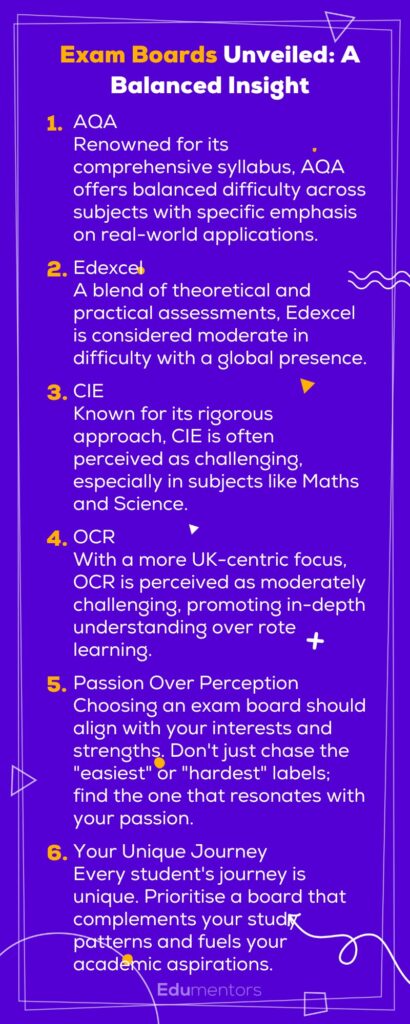A-Level exams: a rite of passage and a gateway to advanced education. But with the school making the decision on which exam board to use, it ensures that students receive the best curriculum tailored to their needs. It’s like standing at the crossroads of your academic journey, pondering where each turn might lead and feeling reassured that you’re being guided on the right path. We’re here to illuminate those paths for you.
The world of A-Level exam boards in the UK is as diverse as it is intricate. Pedagogues have crafted each board with specific skills, content, and methods of assessment in mind. So, if you find yourself asking questions like: What is the most popular A level exam board? Which exam board is most favoured by schools? or even What are the main UK exam boards to consider? then stick around. This guide is to empower you with the knowledge and confidence to understand the A-Level journey.

Importance of Schools Choosing the Right A-Level Exam Board
Navigating the realm of advanced academic qualifications can seem daunting. Especially when understanding the multiple A-Level boards available in the UK. The choice of exam board shapes the trajectory of your higher education, ultimately influencing university admissions and your overall passion for the subjects you opt for. So, the big question that lingers for many is what are the main UK exam boards and how do they vary? By understanding the nuances of the exam boards that schools opt for, you can better appreciate the unique offerings and advantages of each.
Brief Mention of How Various Boards Differ in Difficulty and Popularity
When diving deeper into the heart of A-Levels, one inevitably stumbles upon queries such as Which is the hardest board in the UK? What is the most popular A level exam board? or What is the easiest exam board for A-levels? These are valid considerations, as boards like AQA, Edexcel, CIE, and OCR all come with their unique challenges and attributes. Some argue for a board’s comprehensiveness or global recognition, while others highlight specific content or easier grading. However, perceptions of difficulty and popularity are subjective and depend on individual strengths, preferences, and career goals.
A Brief Overview of the Main UK Exam Boards
In the intricate tapestry of the UK’s educational system, four major exam boards stand out, each with its distinct history, approach, and reputation. These are AQA, Edexcel, CIE, and OCR. Navigating through A-levels requires not just academic prowess but also an understanding of these boards, as the choice can influence a student’s academic trajectory and future opportunities. Each board carries its unique merits, they collectively represent the gold standard of advanced secondary education in the UK. Whether you’re a student charting your A-level path or simply an enthusiast keen on understanding the educational landscape, this exploration promises rich insights.
AQA-Assessment and Qualifications Alliance
The Assessment and Qualifications Alliance (AQA), one of the UK’s largest exam boards, emerged from the merger of several older boards dating back to the late 19th century. It plays a crucial role in the British education system, upholding a legacy of excellence and fairness in academic assessment.
Subjects Offered and Their Reputation
AQA offers a vast range of subjects, catering to the diverse interests of students across the UK. From traditional subjects like Mathematics, History, and English to more contemporary ones like Media Studies or Environmental Science, AQA covers a comprehensive spectrum. What sets AQA apart is its meticulous and structured approach to each subject. For instance, their Mathematics A-level is often lauded for its balance between theory and real-world application. Similarly, subjects like English and History are celebrated for their depth, inclusivity, and focus on critical thinking. Many educators and students alike have praised AQA’s consistent and holistic approach to subject matter, making it a popular choice among those seeking both challenge and clarity in their A-level studies.
CIE-Cambridge International Examinations
The Cambridge International Examinations (CIE) is a titan in the world of international education. Originating from the prestigious University of Cambridge, CIE has a storied history dating back to the 1850s. Over the years, it has evolved to meet the changing needs of the global educational community. Its importance stems from its historical roots and global reach, attracting students from over 160 countries annually. Known for its strict academic standards, CIE epitomizes excellence in international education, equipping students for success in a dynamic global environment.
Subjects Offered and Their Reputation
CIE offers a vast array of subjects, catering to diverse academic interests and passions. Whether it’s the humanities, sciences, languages, or arts, CIE has it all. Their A-level courses, in particular, are highly regarded for their depth and comprehensiveness. Subjects like A-Level Mathematics, Chemistry, and History are especially acclaimed for their rigorous content, providing students with a solid foundation for university and beyond. Moreover, the reputation of CIE extends beyond just content; their approach to assessment, which emphasises critical thinking and application, is lauded by educators worldwide. As a result, students under the CIE board are often recognised for their holistic understanding of subjects and their readiness to tackle higher education challenges.

OCR-Oxford, Cambridge and RSA Examinations
Oxford, Cambridge and RSA Examinations, commonly known as OCR, is one of the UK’s leading examination boards. Founded in 1998 from the University of Cambridge’s Local Examinations Syndicate and the RSA Examinations Board, OCR boasts a rich heritage and a commitment to meeting the needs of educators and learners. It emphasises fairness, inclusivity, and innovation, continuously evolving to meet modern educational demands.
Subjects Offered and Their Reputation
OCR offers a comprehensive range of subjects spanning across the academic spectrum. From the core sciences and mathematics to arts, humanities, and vocational courses, OCR ensures that all students find a subject that aligns with their interests and aspirations. Their A-level courses are meticulously designed, offering depth, clarity, and real-world relevance. Subjects like A-Level Physics, English Literature, and Computer Science are particularly esteemed for their comprehensive curricula and clear assessment criteria. One standout aspect of OCR is its focus on fostering analytical and evaluative skills in students. As a result, OCR graduates are often commended for their ability to think critically and approach problems with a holistic perspective, making them well-prepared for the challenges of higher education and beyond.
What is the Most Popular A Level Exam Board in the UK?
Navigating the UK’s A-Level landscape often prompts questions like, “What is the most popular A level exam board?” or “Which exam board is the hardest for A-levels?”. Exploring why certain exam boards like AQA, Edexcel, CIE, and OCR are more popular, this section clarifies key factors and offers guidance on choosing the best A-level board.
The UK boasts several established A-level exam boards, each with its unique set of strengths, specialisations, and teaching methodologies. However, in terms of sheer numbers and widespread recognition, AQA typically emerges as the most popular exam board for A-levels in the UK. AQA is renowned for its diverse range of subjects and its consistently high standards in exam administration and curriculum design.
Insights into the Factors Driving their Popularity
There are a plethora of reasons that contribute to the popularity of certain exam boards over others:
- Comprehensive Range of Subjects: Boards like AQA offer a wide variety of subjects, ensuring that students from different academic backgrounds and interests can find courses that align with their aspirations.
- Resource Availability: Popular boards often come with a vast array of resources, from past papers to revision guides and more, making the preparation process more streamlined for students.
- Recognition and Credibility: Exam boards with a strong reputation, like AQA or Edexcel, are recognised by universities and employers both in the UK and internationally. This recognition often gives students an edge in competitive academic and job markets.
- Innovative Teaching Methods: Many of the leading boards continuously innovate their teaching and assessment methods, incorporating real-world applications and critical thinking skills, which are immensely beneficial for students.
- Feedback and Support: The most popular boards often provide robust support mechanisms, including timely feedback on exams, dedicated helplines, and teacher training programs, ensuring that both educators and students have the tools they need to succeed.
Evaluating Exam Board Difficulty by Subject
Navigating the waters of A-levels, one frequently encounters questions such as “Which exam board is the hardest for A-levels?” or “What is the easiest exam board for A-levels?”. Here, we’ll delve into each subject to evaluate the difficulty landscape across various exam boards.
Maths
What is the Hardest Level of Maths exam board?
Many students and educators often debate between Edexcel and OCR, citing variations in question types and depth of syllabus. However, perceptions of difficulty can be subjective, and often it’s more about the fit between the student’s strengths and the board’s style.
Easiest a Level Maths Exam Board?
AQA is sometimes cited as being more straightforward, but again, this can be subjective based on individual strengths and study methods.
Chemistry
What is the Hardest Exam Board for a Level Chemistry?
Historically, students have found the CIE board to present a more rigorous set of questions, especially in the practical aspects.th
Which Exam Board is Easiest for a Level Chemistry?
AQA tends to be seen as more accessible for many, but it’s worth noting that no A-Level is truly “easy”; the accessibility depends on individual preparation and understanding.
Biology
Which Exam Board is the Hardest for a Level Biology?
Edexcel’s depth and breadth in some topics make it challenging for some students, especially when diving into intricate molecular processes.
Which Exam Board is Easiest for a Level Biology?
OCR has a reputation for a more straightforward approach, but students should still expect comprehensive coverage of all key biological concepts.
Physics
Hardest a Level Physics Exam Board?
OCR and CIE have been noted to set more conceptually challenging questions, demanding a deeper understanding of topics.
Easiest a Level Exam Board for Physics?
AQA tends to balance practical application with theory, making it more approachable for some students.
Psychology
What exam board is psychology a level seen as challenging?
Edexcel often dives deep into various psychological theories, making it a tough contender.
Easier Route for A-level Psychology?
While AQA covers a broad spectrum of topics, its structured approach can make content absorption a tad simpler.
History
What exam board is a level history perceived as demanding?
CIE’s comprehensive approach to global history, including varied sources and viewpoints, can be seen as more challenging.
More Navigable Board for A-level History?
AQA, with its clear structuring, often makes it easier for students to frame their answers effectively.

Economics
What is the Best Exam Board for a Level Economics in Terms of Depth?
Edexcel’s focus on real-world application and extensive case studies means students need a deep understanding of current economic scenarios.
Which Board Offers a More Streamlined Approach to A-level Economics?
AQA’s structured modules and clear guidelines often make it a favourite for students looking for a more guided approach.
The “hardest” or “easiest” exam board can greatly vary depending on individual preferences, strengths, and teaching methods. It’s essential to review the syllabus and past papers to gauge which board aligns best with one’s aptitude and study strategies.
How Different Exam Boards Format Their Exams
Each exam board has its own unique style, influencing how students approach their revision and tackle exam questions. Let’s demystify these formats:
- AQA: Known for its structured and straightforward approach, AQA typically provides clear guidelines in their questions, often in bullet point format. This assists students in clearly identifying what is required of them.
- Edexcel: This board is renowned for its application-based questions. Students might be presented with real-world scenarios or data sets, challenging them to apply their theoretical knowledge practically.
- CIE: Cambridge exams often delve deeper into topics, requiring a thorough understanding. Their questions are comprehensive, ensuring students truly grasp the breadth and depth of the syllabus.
- OCR: With a mix of short-answer and extended-response questions, OCR ensures students not only know the content but can elaborate on concepts and provide critical analysis.
Insights into Grade Boundaries and What Makes Certain Boards Seemingly “Easier” or “Harder”
Grade boundaries can be a confusing aspect of the A-level system, but they play a pivotal role in how students’ performances are assessed.
Dynamic Grade Boundaries: It’s essential to understand that grade boundaries are often dynamic. They can shift based on overall student performance in that year, ensuring fairness in the grading process.
Perceived Difficulty: Some boards might have a reputation for being “harder”, but it’s crucial to note that their grade boundaries might be set lower. For instance, a board with challenging questions may have a boundary of 60% for an A, whereas a board with more straightforward questions might have it set at 70%.
Subjectivity: Often, what’s considered “easier” or “harder” is subjective. Some students might find application-based questions more challenging, while others struggle with recall-based queries.
Preparation Strategy: The “difficulty” of an exam can also be influenced by one’s preparation strategy. Aligning revision methods with the exam board’s style can make the examination seem more manageable.
Understanding the nuances of each board’s formatting and grading system is paramount. It not only informs one’s revision strategy but also sets the right expectations, helping alleviate some of the stress associated with A-levels.
Factors Schools Consider When Choosing an Exam Board
Embarking on the A-Level journey is a significant step in your academic life. But with multiple exam boards available, how do schools make the right choice? Here’s a guide to streamline their decision:
Syllabus Content: First and foremost, schools review the syllabi of the respective boards for various subjects. Are there topics in one board’s syllabus that resonate more with the curriculum they wish to deliver?
Teaching Resources: Some schools might have a wealth of resources for a particular board, making teaching and preparation a smoother experience.
Past Exam Papers: Schools explore past papers to get a feel for the type of questions asked by each board. This helps in understanding which format aligns with their teaching methods.
Reputation and Recognition: While all UK exam boards are internationally recognised, some might have a stronger reputation in specific subjects or regions.
Feedback from Seniors: Schools often communicate with each other to share experiences and insights into the intricacies of each board.

Emphasis on Aligning Strengths and Preferences with the Board’s Style and Requirements
While external factors are essential, introspection is equally crucial. After all, your A-Level journey should be aligned with your strengths and study preferences:
Learning Style: Are you someone who prefers application-based learning or rote memorization? Match your style with the board that best supports it. For instance, if you enjoy practical applications, Edexcel with its real-world scenarios might be more up your alley.
Assessment Preference: Do you fare better with essays, multiple-choice questions, or problem-solving tasks? Some boards might emphasise one format over the others.
Feedback and Support: How does each board support its students? Some might offer more comprehensive feedback, aiding in pinpointing areas of improvement.
Future Aspirations: Your choice might also be influenced by your future goals. For instance, if you’re eyeing a particular university or course, check if they have a preference for one board over the others.
While the multitude of choices might seem overwhelming initially, a methodical approach can help you pinpoint the board that aligns best with your academic strengths and future aspirations. Remember, the goal is to set yourself up for success, so choose wisely!
Conclusion
Embarking on the A-level journey is a monumental step in your academic life, and understanding the choices your school makes can help you appreciate the curriculum you’ll engage with. 🧐
It’s easy to be influenced by popular opinion or the perceived reputation of an exam board. However, it’s essential to recognise that your A-level journey is tailored to the decisions made by educational experts. 🚀 Why go with a certain board if your school believes another is better suited?
Your A-Level experience is about engaging with the curriculum provided, leveraging the resources at hand, and maximising your potential. 📘💡
However, while self-introspection is vital, seeking external guidance can also be incredibly beneficial. That’s where online tutoring steps in. Personalised online tutoring, like Edumentors suggests, can offer you tailored strategies, expert insights into different exam boards, and consistent support throughout your A-level journey. It’s like having a mentor guiding you, ensuring you not only navigate the curriculum effectively but also excel in it. 🎓🌐
So, as you prepare for your A-Levels, consider roping in the expertise of an online tutor to complement your individual efforts. The blend of self-awareness and expert guidance can truly make a difference.
Remember, success in A-levels isn’t solely about understanding the board your school chose but ensuring you leverage the opportunities it provides. So, step forward with confidence, embrace informed decisions, and let your academic journey shine with the added advantage of personalised online tutoring! 🌟🌈🎉








